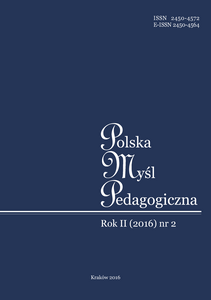Założenia realizmu ontologicznego i aksjologicznego w koncepcji wychowania Jacka Woronieckiego
Assumptions of ontological and axiological realism in Jacek Woroniecki's concept of education
Author(s): Krzysztof ŚlezińskiSubject(s): Anthropology, Education, Epistemology, Ethics / Practical Philosophy, Philosophy of Religion
Published by: Wydawnictwo Uniwersytetu Jagiellońskiego
Keywords: Jacek Woroniecki; ethics of education; neo-Thomism; ontological realism; epistemological realism;aretology;
Summary/Abstract: The following paper presents Woroniecki's concept of education that hankers back to the achievements of Christian and classical thought. It is based on ontological and epistemological realism in declaring the necessity of integral and universalist human education and training. This pedagogy is based on the assumptions of philosophical anthropology, and Aristotelian and Thomaston ethics; approaches which present who a man is and what moral goodness is as an aim of human struggle. This aim is simultaneously the aim of pedagogy, and thus all undertakings and ways of supporting the learner are to be subordinated to this aim. We can attribute to Woroniecki's pedagogical views, apart from category realism, the more general category of universality. Pedagogy, perceived as educational ethics integral to all human education and training, can be understood as being addressed to everyone. The realism of this pedagogy is based on the conviction that everyone should develop in one's individual and social life in accordance with one's potential, which should be realized by working on oneself.
Journal: Polska Myśl Pedagogiczna
- Issue Year: 2/2016
- Issue No: 2
- Page Range: 175-187
- Page Count: 13
- Language: Polish

